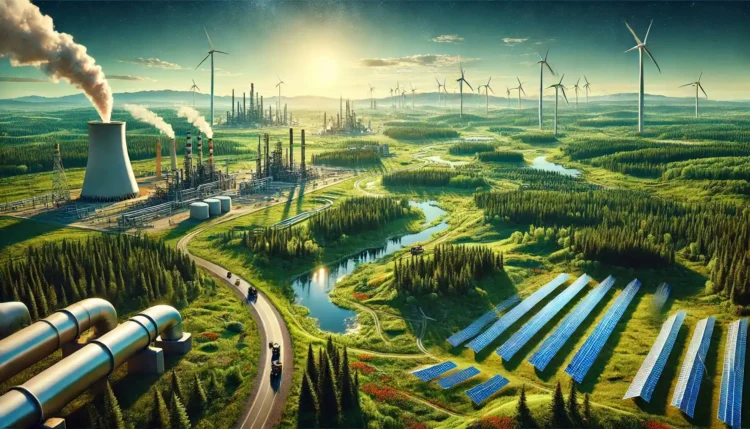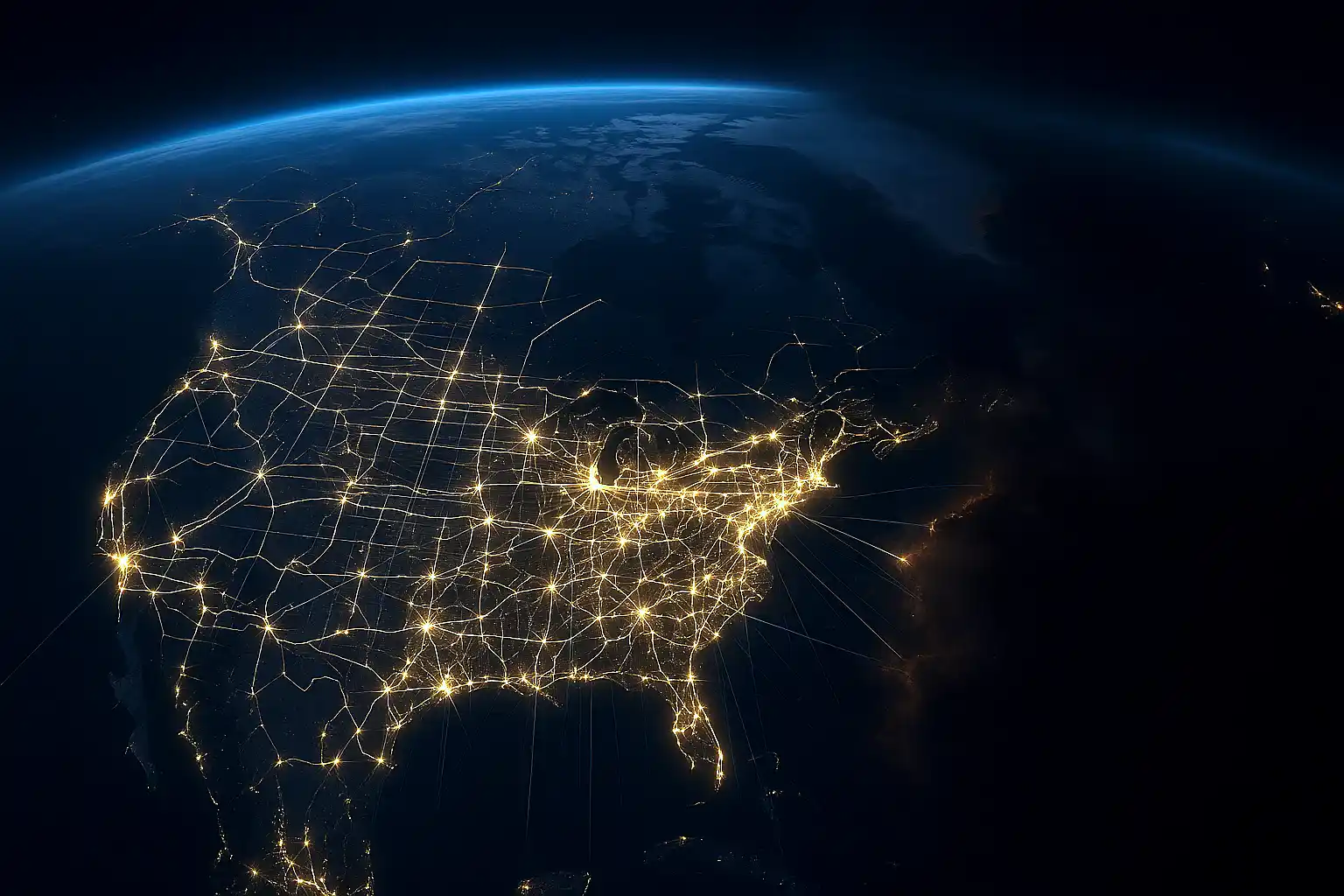Executive Summary
Introduction
Context and Purpose
-
China, for instance, expanded its electrical generation capacity by over 550% in the last two decades (IEA, 2023) and built a shipbuilding capacity that some analysts estimate to be hundreds of times larger than that of the United States (Defense News, 2022; SIPRI, 2023).
-
Turkey is simultaneously constructing dozens of naval vessels, showcasing a remarkable acceleration in defense readiness (Jane’s Defense, 2023).
Section I: The Foundational Role of Affordable Energy
-
HOUSES: Construction materials (lumber, steel, concrete) and their transport, along with heating/cooling systems, are heavily dependent on affordable fuels and electricity.
-
JETS: Aviation’s viability depends on cost-effective jet fuel, engine manufacturing, and materials — all energy-intensive to produce.
-
MISSILES: Defense systems rely on energy for forging metals, fabricating electronics, and powering manufacturing plants.
-
BULLETS: Ammunition production involves metal smelting, shaping, and logistics — all requiring energy.
-
FACTORIES: Industrial operations, from automotive assembly lines to automated robotics, depend on stable and cost-effective electricity and fuel.
-
SHIPS: Both commercial and military vessels need affordable fuels for construction, maintenance, and global maritime operations.
-
HELICOPTERS: Specialized engineering processes for rotorcraft are energy-intensive, and operational fuel costs are significant.
-
DRONES: Advanced drones for agriculture, defense, and surveillance require high-tech manufacturing processes powered by reliable energy.
-
COMMERCIAL BUILDINGS: Office towers, malls, and industrial complexes consume vast amounts of energy in construction and ongoing operations (lighting, heating, cooling).
-
PIPELINES: Infrastructure for transporting oil, natural gas, or other resources requires considerable energy to construct, maintain, and operate.
-
CARS: From manufacture to fuel, the automotive sector depends on energy affordability to keep personal and commercial transport viable.
-
FARMS: Modern agriculture needs energy for machinery, irrigation, fertilizers, and distribution of produce.
-
NEW VILLAGES, TOWNS, CITIES: Planning and expanding settlements require enormous energy inputs for land development, construction, and utilities.
-
CLOTHING: Textile production and logistics involve energy at every step, from synthetic fiber creation to global shipping.
-
HIGH-SPEED RAIL: Electrified rail systems are large-scale energy consumers, both in construction and daily operation.
-
ROCKETS: Launch vehicles for space exploration demand vast amounts of refined fuels and highly energy-intensive manufacturing.
-
SATELLITES: Producing and launching satellites for communication and security depends on advanced energy resources.
-
ARTIFICIAL INTELLIGENCE: AI relies on power-intensive data centers for training large-scale models and real-time processing.
-
SEMICONDUCTORS: Chip fabrication is exceptionally energy-intensive and requires stable, high-quality power sources.
-
ROBOTS, BLOCKCHAIN: Robotics assembly and blockchain computations consume significant electrical power for processing.
-
INDUSTRY 4.0 SYSTEMS: Integrating 30+ emerging technologies in smart factories demands robust energy supplies for continuous innovation.
-
BABIES: Raising the next generation requires affordable food, housing, healthcare — all reliant on cost-effective energy.
-
MEDICAL SYSTEMS: Hospitals, laboratories, and medical devices rely on continuous, affordable power for everything from MRI machines to vaccine cold chains.
-
FOOD SUPPLY CHAINS: Beyond farms, processing, refrigeration, and transportation of food also hinge on stable energy costs.
-
WATER SYSTEMS: Desalination, irrigation, purification, and distribution all depend on consistent, affordable energy.
-
RENEWABLE ENERGY INFRASTRUCTURE: Solar panels, wind turbines, and battery technology themselves have an energy-intensive supply chain for mining, smelting, and manufacturing.
-
EDUCATION INFRASTRUCTURE: Schools, tech labs, and digital education platforms require stable energy to power devices and climate control.
-
DEFENSE SYSTEMS: Beyond bullets and missiles, everything from cyber defense and surveillance to troop logistics requires abundant, cost-effective energy.
-
RESEARCH AND DEVELOPMENT: Labs pushing the boundaries of science and engineering depend on affordable energy to operate sophisticated equipment.
-
ENTERTAINMENT AND CULTURE: Large-scale events (music festivals, film production) need robust, cost-efficient power.
-
DIGITAL INFRASTRUCTURE: Data centers, global internet connectivity, and cloud platforms are exceptionally energy-hungry, shaping the backbone of modern communication.
Section II: How the Carbon Tax Erodes Competitiveness and Sovereignty
1. Inflationary Pressure Across Sectors
2. Risk of Industrial Flight
3. Undermining National Security and Defense
-
Canada’s ability to build or maintain advanced military hardware, from ships to jets to cyber systems, diminishes (SIPRI, 2023).
-
Research and development in cutting-edge defense tech, reliant on stable funding and infrastructure, risks being underprioritized.
4. Threats to Energy Independence
5. Strangling the Path to Industry 4.0
Section III: Geopolitical Context
1. Global Rearming and the Need for Domestic Capacity
-
China increased its electrical generation by over 550% in just two decades (IEA, 2023). Its shipbuilding capacity is, according to some estimates, vastly higher than the United States 262x (Defense News, 2022).
-
Turkey, meanwhile, is building a formidable naval fleet — reportedly over 30 new vessels simultaneously (Jane’s Defense, 2023).
Section IV: Case Study—Pipelines and National Competitiveness
-
Pipeline Projects: Building, maintaining, and operating pipelines is energy-intensive. Project viability decreases significantly under elevated carbon taxes, discouraging private investment.
-
Economic and Job Losses: Provinces like Alberta lose billions in potential revenue and thousands of jobs (Statistics Canada, 2023).
-
Strategic Vulnerability: Import reliance for oil and gas can create supply-chain vulnerabilities and reduce Canada’s leverage on the global stage.
Section V: Recommendations for Policymakers
-
Reassess the Carbon Tax Framework: Consider alternatives such as revenue-neutral carbon dividends or targeted incentives for cleaner tech that do not uniformly raise energy costs. Phase out or reduce carbon tax rates during periods of high inflation to prevent undue economic strain (OECD, 2023).
-
Promote Domestic Energy Production and Innovation: Encourage research grants for cleaner extraction technologies in oil and gas. Invest in advanced nuclear (SMRs), hydrogen production, natural gas transport systems, hybrid systems, material science upgrades to vehicles and other emerging energy solutions to diversify Canada’s portfolio while maintaining affordability.
-
Protect Strategic Industries: Implement special provisions or tax credits for defense, aerospace, AI, and semiconductor sectors to keep them competitive. Facilitate public-private partnerships to bolster domestic manufacturing and R&D in critical technologies.
-
Focus on Global Competitiveness: Reduce bureaucratic hurdles to expedite pipeline and infrastructure projects. Negotiate favourable trade deals that secure critical resources and ensure energy-related exports remain viable.
-
Balance Environmental Responsibility with Economic Realities: Use market-driven approaches to reduce emissions, such as technological innovations in carbon capture, rather than heavy-handed taxes. Foster collaboration with other energy-producing nations (e.g., the United States) to share best practices and maintain fair carbon accounting measures.
Conclusion
References
-
International Energy Agency (IEA). (2023). World Energy Outlook 2023.
-
BP. (2023). Statistical Review of World Energy 2023.
-
Fraser Institute. (2023). Economic Impacts of Carbon Taxation in Canada.
-
NATO. (2022). Defense Expenditure of NATO Countries (2014 – 2022).
-
Organization for Economic Cooperation and Development (OECD). (2023). Industrial Competitiveness and Energy Policy: Balancing Climate Goals and Economic Growth.
-
Stockholm International Peace Research Institute (SIPRI). (2023). Global Defense Spending and Arms Transfers.
-
Jane’s Defense. (2023). Naval Shipbuilding Reports: Turkey’s Fleet Modernization Program.
-
Defense News. (2022). China’s Shipbuilding Surge: Comparative Analysis with Global Powers.
-
Statistics Canada. (2023). Oil and Gas Economic Indicators.
“The Carbon Tax is FOUNDATIONAL to the Liberals’ agenda, blocking Canadians from being able to finance their own future. Affordable oil isn’t just a commodity — it’s the linchpin for modern civilization.”
Final Note
Related Content:
SGT Military Page: https://skillsgaptrainer.com/category/military-science/
SGT Communications Page: https://skillsgaptrainer.com/category/communications/
Title: “Economic Impact of Blocking Resource and Energy Sectors in Canada” https://skillsgaptrainer.com/economic-impact-blocking-resource-energy/
Title: “Understanding the Real Threats: Distinguishing Russia’s Regional Ambitions from China’s Global Strategy” https://x.com/SkillsGapTrain/status/1880182282499014698
Title: “Canada’s Resource Power: The Case for a Strategic Alliance with the USA to Safeguard Sovereignty and Civilization” https://x.com/SkillsGapTrain/status/1880078992767684833
Title: “Future-Proofing Canada’s Navy: How the Type 83 Outmatches the Type 26” https://x.com/SkillsGapTrain/status/1879385085503537275
Title: “The Strategic Value of the MQ-9B SkyGuardian & MQ-28 Ghost Bat for Canada’s Comprehensive Defense” https://x.com/SkillsGapTrain/status/1877801121181225125
Title: “Canada’s Defense at a Crossroads: Evaluating the Impact of Disarmament Policies, Military Weakness, and the Path to Sovereignty Resilience” https://x.com/SkillsGapTrain/status/1877258462876385323
Title: “Global Health Governance in Crisis: A Stress-Test of World Health Organization (WHO) Vulnerabilities” https://x.com/SkillsGapTrain/status/1876886255788605746
Title: “Forging the Future: Securing Global Supply Chains for Technological Independence” https://x.com/SkillsGapTrain/status/1875821150057668873
Title: “The Illusion of Open Borders: How Post-National Dreams Could Cost Canada Its Future” https://x.com/SkillsGapTrain/status/1874899517834670286
Title: “Hi Pierre. The video provided in the link below is really useful for aspiring homeowner or all homeowner’s to see. (the video below about C40 cities/15-minute cities).” https://x.com/SkillsGapTrain/status/1880774179017883894
Title: “Esteemed Heads of State and Government: In light of ongoing global challenges and mounting evidence of orchestrated threats to national sovereignty, civil liberties, and the stability of democratic societies, we respectfully submit this statement and Action Plan.” https://x.com/SkillsGapTrain/status/1880635423568855234
Title: “Alberta’s Success: A Reflection of Resource Strength & Leadership Traits?” https://x.com/SkillsGapTrain/status/1872967052283048090
Title: “Building a Resilient and Sustainable Transportation System: Balancing Electrification, Hybrid Solutions, and Hydrogen Innovation” https://x.com/SkillsGapTrain/status/1872219005127446611
Title: “Beyond EVs: Top 10 Revolutionary Vehicle Technologies for a Sustainable and Innovative Future” https://x.com/SkillsGapTrain/status/1842412739064410158
Title: “Towards a Sustainable Future: Integrating Hydrogen, CNG, and Electric Vehicles in Modern Transportation” https://x.com/SkillsGapTrain/status/1818158056431141236
Title: “Enhancing Vehicle Efficiency Through Weight Reduction and Natural Gas Hybrid Systems” https://x.com/SkillsGapTrain/status/1817313442212065628
Title: “The NextGeneration Tesla: A Comprehensive Engineering & Philosophical Blueprint for Resilient, Modular, and EMP-Hardened EVs in an Uncertain 21st Century” https://x.com/SkillsGapTrain/status/1865093662226460900
Title: “Hi Jeremy Clarkson, You’re a truly remarkable person, and it’s great to see that life hasn’t dimmed your admirable personality.” https://x.com/SkillsGapTrain/status/1858656859692908730
Title:“Navigating the Dystopian Singularity: Shaping TNG-Inspired Future Amidst Colliding Dystopias” https://x.com/SkillsGapTrain/status/1858067423959629829
Title: “It’s wonderful to see such kind words and recognition for this article. For many decades, and through numerous incredibly challenging conflicts, Canada has promoted peace and stability as part of the Commonwealth, proudly as one of its founding members.” https://x.com/SkillsGapTrain/status/1858348845047894418
Title:“The Path to Peaceful Coexistence: Charting a Course for Global Democracy and Enhanced Cooperation” https://skillsgaptrainer.com/the-path-to-peaceful-coexistence/
Title: “We see the farmers rising to defend their livelihoods once again.” https://x.com/SkillsGapTrain/status/1858598281518936146
Title:“Agreed. Farmers are the true stewards of rural governance, directly connected to the land and essential to sustaining life.” https://x.com/SkillsGapTrain/status/1857226241717260458
Title: “Critique of the 15-Minute City Model: A Call for Practicality, Sustainability, and Security” https://x.com/SkillsGapTrain/status/1843922512050004143
Title: “Safeguarding Existence: The Farmer’s Role in an Era of Smart Cities and AI Dominance” https://skillsgaptrainer.com/safeguarding-existence-the-farmers-role/
Title:“The Great Convergence: Resisting the Digital Authoritarianism & Centralized Control of Smart Cities for a Future of Genuine Progress and Freedom” https://x.com/SkillsGapTrain/status/1843323244805538150
Title: “Unleashing Canada’s Potential: Axing the Barriers to Land and Prosperity” https://x.com/SkillsGapTrain/status/1806452246068007323
Title:“Canada’s Hidden Frontier: 99.75%+ Untapped Potential and Unclaimed Wealth” https://x.com/SkillsGapTrain/status/1806429928914825379
Title: “Blockchain Revolution: Tokenizing Land and Non-Perishable Metals to Secure an Economic Future” https://x.com/SkillsGapTrain/status/1806444549642109296
Title:“Military, political, and corporate alliances… — such as BRICS, Russia, China, the WEF, and the WHO —” https://x.com/SkillsGapTrain/status/1853952073563291925
Title: “Unlocking Canada’s Crown Lands: A Path to Economic Revival and National Prosperity” https://skillsgaptrainer.com/unlocking-canadas-crown-lands/
Title: “Futuristic Homes for a Resilient Canada: Bridging the Housing Gap with Space-Aged Pod Houses” https://skillsgaptrainer.com/futuristic-homes-for-a-resilient-canada/
Title: “Revolutionizing Homeownership in Canada: The Untapped Potential of Innovative Land Policies” https://skillsgaptrainer.com/revolutionizing-homeownership-in-canada/
Title: “The Great Filter Ahead: Engineering a Pathway to Complex Civilizational Survival and Overcoming Cosmic Hurdles” https://skillsgaptrainer.com/the-great-filter-ahead-engineering-a-pathway/
Title:“Restoring Justice for Millennials and Gen Z: Addressing Economic Inequities Through Fair Land Redistribution” https://x.com/SkillsGapTrain/status/1839460023484723289
Title:“Imagine this: If Elon Musk also turned his innovative genius towards solving the housing crisis, adding yet another groundbreaking company to his portfolio.” https://x.com/SkillsGapTrain/status/1782623773889270221
Title:“Rural land is especially valuable in the 21st century for several key reasons (Note: This is not an exhaustive list)” https://x.com/SkillsGapTrain/status/1815614092977053707
Title: “The Truth Behind Modular Housing Policy: Innovation or Imitation? The Public is Led to Believe the First, but SGT Knows It’s the Second” https://x.com/SkillsGapTrain/status/1807841519124308123
Title:“To us, Canada’s housing inflation looks like an invention of the land supply policy makers, from the permitting administrators, from the citizen’s own political leaders.” https://x.com/SkillsGapTrain/status/1802393608672182369
Title: “Pierre Poilievre’s Stand Against Carbon Taxation: Unveiling Canada’s Fight Against A Shift in Property Ownership and Investment” https://x.com/SkillsGapTrain/status/1784628947721842700
Title: “Hi Team CCFR and all Sports Communities in Canada” https://x.com/SkillsGapTrain/status/1865694531703668738
Title: “A Better Path for Canada, USA & Europe and Natural Gas Vehicles CNG” https://x.com/SkillsGapTrain/status/1877028626488529154


To see our Donate Page, click https://skillsgaptrainer.com/donate